Abarth 500 595 695 vs VW Tiguan – Which model is better for everyday use?
Both models have their strengths – but which one suits you more?
Compare performance, efficiency, price and space directly: Abarth 500 595 695 or VW Tiguan?
Costs and Efficiency:
Looking at overall running costs, both models reveal some interesting differences in everyday economy.
Abarth 500 595 695 has a slight advantage in terms of price – it starts at 32600 £, while the VW Tiguan costs 32800 £. That’s a price difference of around 223 £.
As for range, the Abarth 500 595 695 performs convincingly better – achieving up to 265 km, about 136 km more than the VW Tiguan.
Engine and Performance:
Under the bonnet, it becomes clear which model is tuned for sportiness and which one takes the lead when you hit the accelerator.
When it comes to engine power, the VW Tiguan has a convincingly edge – offering 272 HP compared to 155 HP. That’s roughly 117 HP more horsepower.
In acceleration from 0 to 100 km/h, the VW Tiguan is to a small extent quicker – completing the sprint in 5.90 s, while the Abarth 500 595 695 takes 7 s. That’s about 1.10 s faster.
In terms of top speed, the VW Tiguan performs distinct better – reaching 242 km/h, while the Abarth 500 595 695 tops out at 155 km/h. The difference is around 87 km/h.
There’s also a difference in torque: VW Tiguan pulls significantly stronger with 400 Nm compared to 235 Nm. That’s about 165 Nm difference.
Space and Everyday Use:
Beyond pure performance, interior space and usability matter most in daily life. This is where you see which car is more practical and versatile.
Seats: VW Tiguan offers somewhat more seating capacity – 5 vs 4.
In curb weight, Abarth 500 595 695 is slightly lighter – 1410 kg compared to 1599 kg. The difference is around 189 kg.
In terms of boot space, the VW Tiguan offers convincingly more room – 652 L compared to 185 L. That’s a difference of about 467 L.
In maximum load capacity, the VW Tiguan performs convincingly better – up to 1650 L, which is about 1100 L more than the Abarth 500 595 695.
When it comes to payload, VW Tiguan clearly perceptible takes the win – 533 kg compared to 385 kg. That’s a difference of about 148 kg.
Who wins the race?
The VW Tiguan proves to be leaves the rival little chance and therefore becomes our DriveDuel Champion!
VW Tiguan is the better all-rounder in this comparison.
 @ Volkswagen AG / VW Media
@ Volkswagen AG / VW Media
VW Tiguan
Abarth 500 595 695
The Abarth 500, particularly in its 595 and 695 renditions, captures the spirit of Italian motoring with its compact yet aggressive design. Known for its lively performance and distinctive styling, this little powerhouse is a joy to drive, offering an engaging experience that appeals to enthusiasts. With its rich motorsport heritage, the Abarth 500 embodies the essence of fun and excitement on both the streets and the race track.
details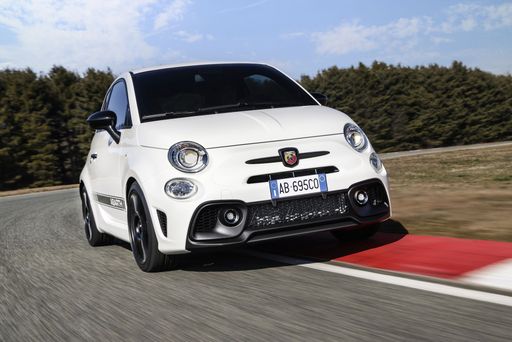 @ Abarth / Stellantis Media
@ Abarth / Stellantis Media
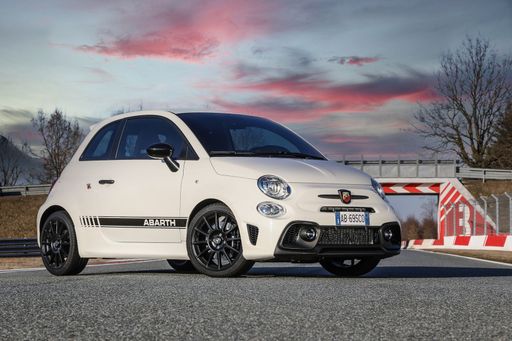 @ Abarth / Stellantis Media
@ Abarth / Stellantis Media
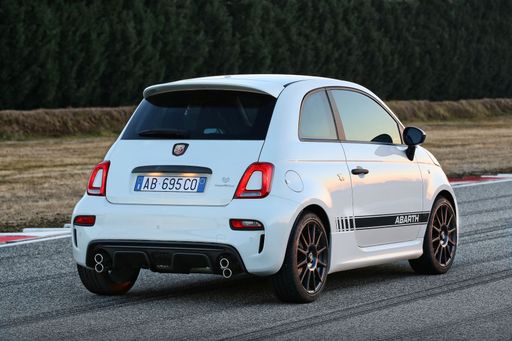 @ Abarth / Stellantis Media
@ Abarth / Stellantis Media
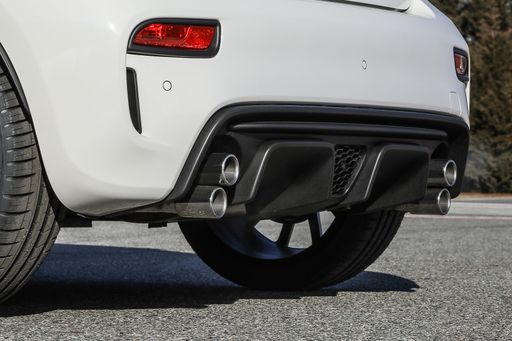 @ Abarth / Stellantis Media
@ Abarth / Stellantis Media
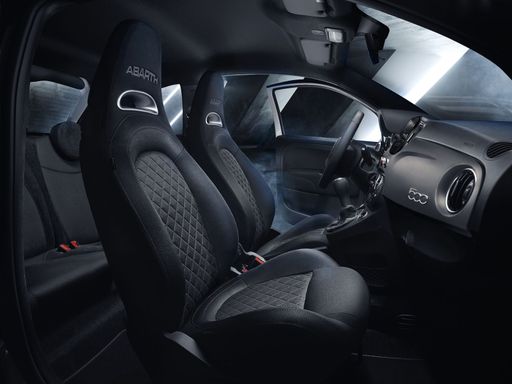 @ Abarth / Stellantis Media
@ Abarth / Stellantis Media
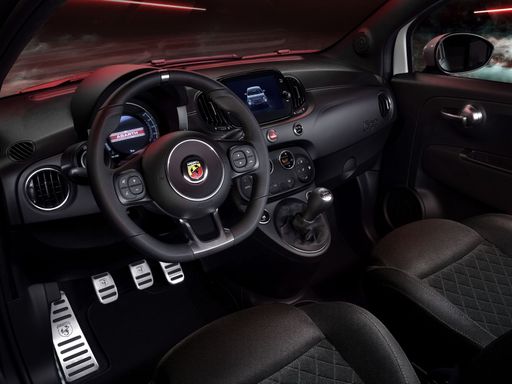 @ Abarth / Stellantis Media
@ Abarth / Stellantis Media
VW Tiguan
The VW Tiguan blends sensible family practicality with a dash of German polish, delivering a calm, reassuring ride and a cabin that never feels like an afterthought. For buyers who want an SUV that’s easy to live with yet still nicely dressed, the Tiguan is the grown‑up choice that keeps a cheeky wink in reserve.
details @ Volkswagen AG / VW Media
@ Volkswagen AG / VW Media
 @ Volkswagen AG / VW Media
@ Volkswagen AG / VW Media
 @ Volkswagen AG / VW Media
@ Volkswagen AG / VW Media
 @ Volkswagen AG / VW Media
@ Volkswagen AG / VW Media
 @ Volkswagen AG / VW Media
@ Volkswagen AG / VW Media
 @ Volkswagen AG / VW Media
@ Volkswagen AG / VW Media
 @ Abarth / Stellantis Media
@ Abarth / Stellantis Media
|
 @ Volkswagen AG / VW Media
@ Volkswagen AG / VW Media
|
|
|
|
Costs and Consumption |
|
|---|---|
|
Price
32600 - 39400 £
|
Price
32800 - 51900 £
|
|
Consumption L/100km
-
|
Consumption L/100km
0.4 - 8.4 L
|
|
Consumption kWh/100km
17.1 - 18.8 kWh
|
Consumption kWh/100km
-
|
|
Electric Range
242 - 265 km
|
Electric Range
119 - 129 km
|
|
Battery Capacity
37.80 kWh
|
Battery Capacity
19.70 kWh
|
|
co2
0 g/km
|
co2
8 - 190 g/km
|
|
Fuel tank capacity
-
|
Fuel tank capacity
45 - 58 L
|
Dimensions and Body |
|
|---|---|
|
Body Type
Hatchback
|
Body Type
SUV
|
|
Seats
4
|
Seats
5
|
|
Doors
3
|
Doors
5
|
|
Curb weight
1410 - 1435 kg
|
Curb weight
1599 - 1890 kg
|
|
Trunk capacity
185 L
|
Trunk capacity
490 - 652 L
|
|
Length
3673 mm
|
Length
4539 mm
|
|
Width
1682 mm
|
Width
1842 - 1859 mm
|
|
Height
1518 mm
|
Height
1656 - 1658 mm
|
|
Max trunk capacity
550 L
|
Max trunk capacity
1486 - 1650 L
|
|
Payload
370 - 385 kg
|
Payload
460 - 533 kg
|
Engine and Performance |
|
|---|---|
|
Engine Type
Electric
|
Engine Type
Plugin Hybrid, Petrol, Petrol MHEV, Diesel
|
|
Transmission
Automatic
|
Transmission
Automatic
|
|
Transmission Detail
-
|
Transmission Detail
Dual-Clutch Automatic
|
|
Drive Type
Front-Wheel Drive
|
Drive Type
Front-Wheel Drive, All-Wheel Drive
|
|
Power HP
155 HP
|
Power HP
130 - 272 HP
|
|
Acceleration 0-100km/h
7 s
|
Acceleration 0-100km/h
5.9 - 10.6 s
|
|
Max Speed
155 km/h
|
Max Speed
198 - 242 km/h
|
|
Torque
235 Nm
|
Torque
220 - 400 Nm
|
|
Number of Cylinders
-
|
Number of Cylinders
4
|
|
Power kW
114 kW
|
Power kW
96 - 200 kW
|
|
Engine capacity
-
|
Engine capacity
1498 - 1984 cm3
|
General |
|
|---|---|
|
Model Year
2023
|
Model Year
2024 - 2025
|
|
CO2 Efficiency Class
A
|
CO2 Efficiency Class
B, G, D, E, F
|
|
Brand
Abarth
|
Brand
VW
|
Is the Abarth 500 595 695 offered with different drivetrains?
The Abarth 500 595 695 is offered with Front-Wheel Drive.
The prices and data displayed are estimates based on German list prices and may vary by country. This information is not legally binding.
